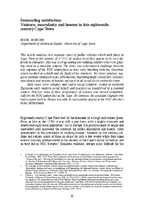Demanding satisfaction: Violence, masculinity and honour in late eighteenth century Cape Town
Abstract
This article analyses two separate cases of public violence which took place in
Cape Town in the summer of 1772/3. At surface level they appear to be very different
in character. One was a scrap among low-ranking soldiers who were playing
cards at a shoreline outpost. The other was a formalised challenge between
two captains of the VOC return fleet as they were lunching with the Governor,
which resulted in a death and the flight of the murderer. Yet closer analysis suggests common ritualised codes of behaviour that intriguingly reveal how violence,
masculinity and notions of honour operated at all social levels within the town.
Both cases were complex and coded social conflicts, rooted in northern
European early modern social beliefs and practices as transferred to a colonial
context. However, none of these perpetrators of violence was viewed sympathetically
by the VOC authorities at the Cape. By contrast, the assailant Captain who
had escaped back to Europe was able to successfully appeal to the VOC directors
in the Netherlands.

